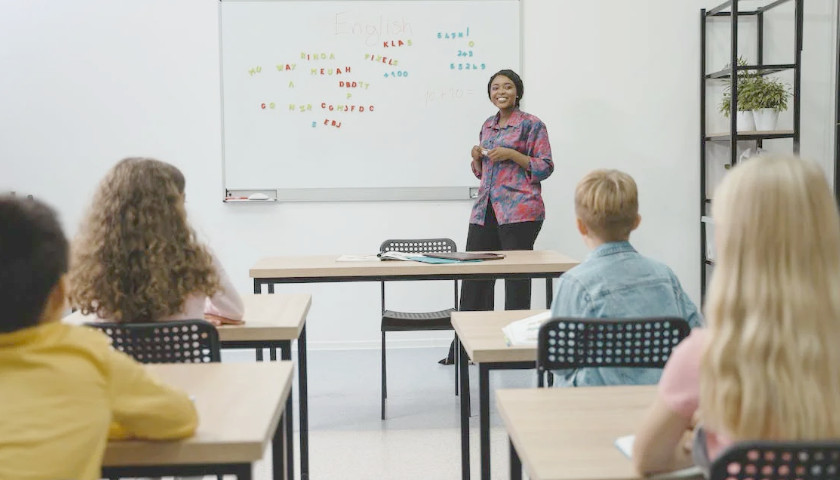The Ohio State Senate passed a 2,144-page Republican-backed bill to “restructure” the Ohio Department of Education on Wednesday.
Senate Bill (SB) 178, sponsored by State Senator Bill Reineke (R-Tiffin), told the Primary and Secondary Education Committee that the bill seeks to “improve the academic achievement and workforce skills of our students, to drive better outcomes in their education, and to prepare for more effective career readiness.”
“Senate Bill 178 addresses this need by refocusing our system at the state level on what matters most: Our children and their future,” Reineke said in his testimony.
The Ohio Board of Education is largely responsible for the decisions shaping K-12 education in the state. This bill will include creating a “state cabinet-level agency,” the Department of Education and Workforce, with the Division of Primary and Secondary Education and the Division of Career Technical Education inside its boundaries. The bill will also reduce the State Board of Education’s role in choosing the state’s superintendent of public instruction, implementing and enforcing rules on teacher licensure, handling educator and staff conduct cases, and considering school territory transfers.
Tuesday’s committee hearing was the first time opponents of the bill could testify, along with proponents and interested parties. Proponents had two hearings to testify in favor of it.
Opponents to the bill, such as Policy Matters Ohio, said that the 11 elected board members represent a democratic process and what Ohioans want for their students.
“The 11 school board members who are elected, they’re out in their communities. They’re talking to people who vote for them in their school districts or the many school districts they represent,” he said. “The current system, you know, it’s not perfect, but it’s really about democratically electing people who are going to shape education policy in our state,” Senior Researcher at Policy Matters Ohio Piet Van Lier said.
Ohio’s Education Association said that the Ohio Board of Education already has a system of checks and balances.
“The system is already set up with a series of checks and balances. The State Board of Education doesn’t have the authority to create law. The legislature creates laws related to education policy all the time,” he said. “You have an independent board that has been created in our Constitution to provide oversight to the department, and it’s not really clear that they’re not doing their job,” President of Ohio’s Education Association Scott DiMauro said.
Tony Podojil of the Alliance for High-Quality Education asked lawmakers to slow down and let people in the education field give feedback on the legislation. He said most of the superintendents in his organization had not yet had an opportunity to review the bill.
Chair of the Primary and Secondary Education Committee State Senator Andrew Brenner (R-Delaware) rebutted, saying that students are academically behind due to the pandemic necessitating quick resolution.
Proponents of the bill, such as Ohio Excels, say that the Ohio Board of Education needs oversight, which is what Senate Bill 178 provides.
“Too often, Ohio governors and legislators bear the public’s blame whenever schools struggle, even though the current system denies them full oversight to make things better. Too much of that authority, including your authority as legislators, has been shifted elsewhere to a little-known, partly elected, partly appointed body, the State Board of Education. We believe that a new education governance structure for Ohio should be about accountability, responsiveness, and relevance in today’s world. It should have clear lines of authority from policy making, budget-setting, legislative intent, and executive coordination with other arms of government,” Ohio Excels spokesperson Lisa Gray said.
The Buckeye Institute said that this legislation pursues reforms that should help sufficiently prepare high school graduates for the workforce.
“State, local, and business leaders have long complained that Ohio’s education system does not sufficiently prepare high school graduates for the workforce, leaving employers without skilled employees and many young people without the knowledge they need to earn a living, afford a house, or support a family. Senate Bill 178 pursues reforms that should help,” Buckeye Institute Research Fellow Greg Lawson said.
Ohio Governor Mike DeWine has also been vocal about supporting this legislation, saying it would be a major improvement.
“I think virtually every governor for 40 or 50 years has wanted to have more control in regard to the department of education. Kind of joint control between the governor’s office. The governor, on certain areas, and other areas by the state board of education, I think is a very significant improvement,” DeWine said.
Senate Bill 178 passed 22-7 in the State Senate Primary and Secondary Education Committee on Wednesday and now moves on for House consideration.
– – –
Hannah Poling is a lead reporter at The Ohio Star and The Star News Network. Follow Hannah on Twitter @HannahPoling1. Email tips to [email protected].





